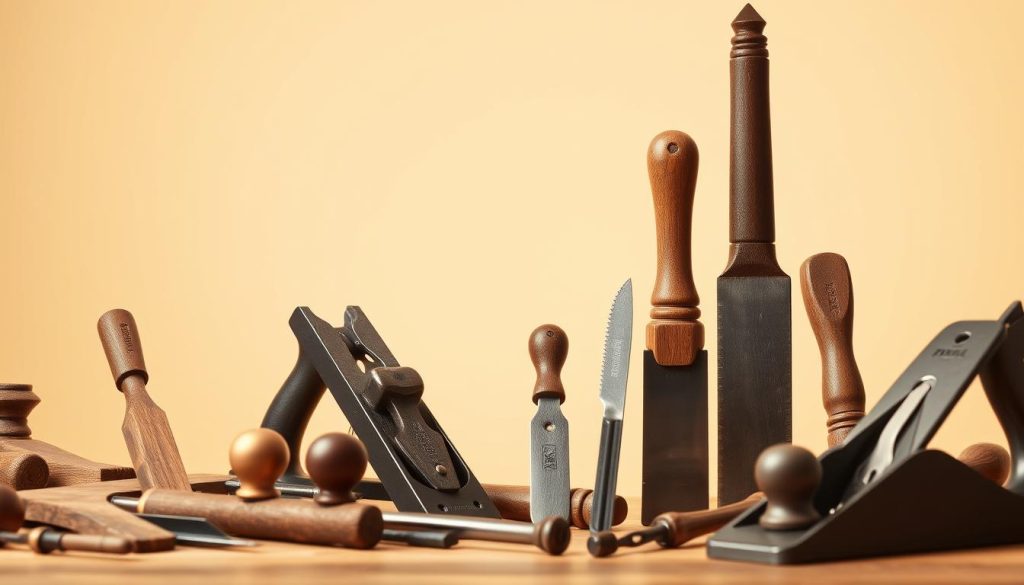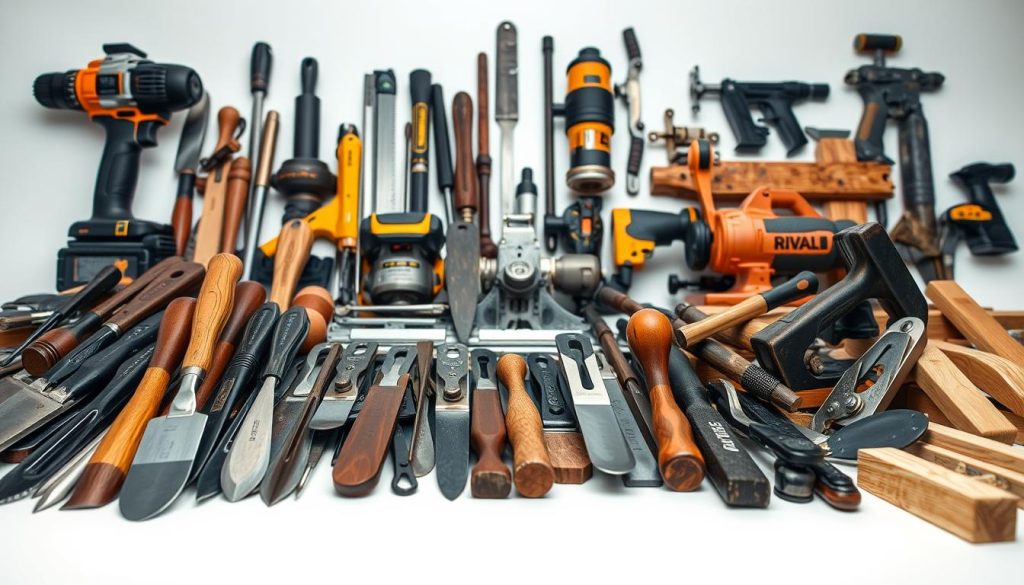Woodworking is more than just making things—it’s a deep form of art. Quality tools are like a painter’s brushes, helping artists create amazing pieces. Every detail, from cuts to designs, relies on the right tools to turn wood into something special.
For woodworkers, the best tools are not just tools but investments in their creativity. The right tools can make projects better, cut down on mistakes, and make work faster. They let artists see their ideas come to life in new ways.
Whether you’re a pro or just starting, the right tools can unlock your full potential. These tools are the key to great woodworking, combining skill with imagination.
Key Takeaways
- Quality tools directly impact woodworking project precision
- Premium woodworking supplies enhance crafting capabilities
- Investing in excellent tools reduces long-term project costs
- Professional-grade equipment supports creative exploration
- Tool selection reflects a woodworker’s commitment to craftsmanship
The Importance of Investing in Quality Woodworking Tools
Woodworking is more than just a hobby; it’s an art that requires precision and skill. The right tools are crucial for every woodworker, whether you’re a beginner or a pro. Quality tools can turn a simple project into a work of art.
Why Quality Matters in Woodworking
Choosing the right woodworking tools is key to a project’s success. The tools you pick affect the precision and quality of your work. High-quality tools offer:
- Enhanced accuracy in cutting and shaping
- Smoother finish and cleaner cuts
- Reduced risk of tool-related mistakes
- Better control during intricate work
Long-Term Cost Benefits of Quality Tools
Quality tools might cost more upfront, but they save money in the long run. They often last longer and need less maintenance. This means:
- Longer operational lifespan
- Lower maintenance costs
- Fewer replacements over time
- Consistent performance
Professional woodworkers see quality tools as an investment, not a cost. By choosing quality, they get better results and more satisfaction in their work.
Types of Woodworking Tools Every Craftsman Needs
Woodworking needs careful tool selection. The right tools can turn a simple project into a work of art. Knowing the right tools for each task is key for all craftsmen.
Every woodworking project needs its own tools. Top brands offer versatile tools for all crafting needs.
Hand Tools: Basics and Beyond
Hand tools are the base of any woodworking kit. They help make precise cuts and detailed work.
- Chisels for carving and shaping
- Hand saws for manual cutting
- Hammers and mallets
- Measuring and marking tools
Power Tools: Key Players in Your Workshop
Power tools make woodworking faster and more accurate. Quality tools can improve your skills greatly.
- Table saw for precision cutting
- Drill press for consistent holes
- Circular saw for quick cuts
- Router for edge detailing
Specialized Tools for Unique Projects
Advanced woodworkers need special tools for complex projects. These tools help with intricate designs and detailed work.
- Lathe for turning wood
- Scroll saw for intricate patterns
- Jointer for creating flat surfaces
- Planer for uniform wood thickness
How to Choose the Right Woodworking Tools
Choosing the right woodworking tools is important. It doesn’t matter if you’re new or experienced. Knowing how to pick the best tools can greatly improve your projects.
Start by looking at your skill level and what you need for your projects. Not all tools are the same. It’s key to find the right tool for your needs.
Assessing Your Skill Level and Needs
Think about these things when picking tools:
- Your current skill level
- Types of projects you plan to undertake
- How often you’ll use them
- Your budget
Researching Brands: What to Look For
When looking at fine woodworking tools, focus on these:
- The quality of materials
- The reputation of the maker
- What other users say
- The warranty and support offered
Frequently Asked Questions About Tools
Woodworkers often wonder about the best tools. The most important thing is to know what you need. Spend time researching, read what experts say, and try out tools before buying.
Remember, good tools are an investment in your work. Look for tools that are precise, durable, and comfortable to use.
Best Brands for Quality Woodworking Tools

Choosing the right woodworking tools can change how you craft. Woodworkers know that a tool’s brand is key to its quality. The top brands offer precision, reliability, and new features that make your projects better.
Top Brands Woodworkers Trust
Many manufacturers are leaders in woodworking tools. Craftsmen often suggest these brands:
- DEWALT – Known for robust power tools and exceptional durability
- Festool – Precision German engineering with premium performance
- Makita – Reliable cordless tools with long-lasting battery technology
- Milwaukee – Heavy-duty tools designed for professional workshops
- Bosch – Innovative designs with cutting-edge technological features
Comparing Tool Features and Value
When picking woodworking tools, don’t just look at the price. Look for brands with good warranties, ergonomic designs, and consistent performance. The DEWALT DWE7491RS table saw and SawStop PCS31230 are great examples of top-quality tools.
Understanding Brand Reputation
A brand’s reputation shows its commitment to quality and service. Woodworkers should check user reviews and professional advice. Choosing well-known brands means better tools and fewer replacements over time.
Essential Features to Look for in Woodworking Tools
Choosing the right woodworking tools is key to a great crafting experience. It’s not just about having tools. It’s about having the right tools that improve your work’s quality and speed.
When looking for top-notch woodworking accessories, some features stand out. These features help you pick the best tools for your needs.
Material Quality and Durability
The best woodworking tools start with their materials. Here’s what to look for:
- High-grade steel for sharp edges
- Strong handles made from hardwood or tough polymers
- Finishes that resist rust
- Parts made with precision
Ergonomics and Ease of Use
Comfort is vital in professional woodworking gear. Tools should help you work longer without getting tired. Look for these ergonomic features:
- Tools that feel balanced
- Handles that are easy to hold
- Adjustments that fit your needs
- Less vibration when in use
Choosing tools with high-quality materials and good design will change your woodworking. It will make each project more fun and accurate.
Maintenance Tips for Your Woodworking Tools
Keeping your woodworking tools in top shape is key. It helps them last longer and work better. Skilled craftsmen know that well-kept tools mean better results every time.
Cleaning Techniques for Optimal Tool Performance
Cleaning your tools is crucial for their life span. Dirt and wood bits can wear them down fast. Here’s how to keep them in prime condition:
- Remove wood shavings after each use with a soft brush
- Use compressed air to blow out dust from power tool vents
- Wipe metal surfaces with a clean, dry cloth to prevent rust
- Apply light machine oil to protect metal components
Smart Storage and Inspection Strategies
Storing your tools wisely is important. It keeps them safe from moisture, extreme temperatures, and damage. Here are some smart storage tips:
- Store tools in a dry, temperature-controlled environment
- Use protective cases or wall-mounted tool organizers
- Keep cutting edges covered or protected
- Conduct monthly inspections for signs of wear or damage
Regular care makes your woodworking tools last longer and perform better. A bit of time spent on maintenance means your tools stay sharp and ready for any task.
Woodworking Tools for Beginners: What to Start With
Starting your woodworking journey means picking the right tools. You want tools that are both affordable and useful. Beginners often feel lost with all the options out there. It’s best to start with basic, versatile tools that help you learn and grow.
Building a basic toolkit doesn’t have to cost a lot. You can find good woodworking supplies without spending too much. This way, beginners can start their craft without worrying about money.
Must-Have Tools for New Woodworkers
- Hand saw: Perfect for precise cutting and learning manual techniques
- Block plane: Essential for smoothing and shaping wood surfaces
- Combination square: Critical for accurate measurements and angle checks
- Chisel set: Fundamental for carving and detailed woodworking
- Clamps: Necessary for holding pieces during cutting and gluing
Affordable Options for Entry-Level Projects
Woodworkers on a budget can find great tools at good prices. Look for starter sets from trusted brands that offer value. Many stores and online sites have beginner tool collections made for new woodworkers.
Start with basic tools and upgrade as you get better and tackle more complex projects. Buying quality tools early can save you money in the long run. It means you won’t have to replace tools often and they will work better.
Upgrading Your Woodworking Tool Collection
Every woodworker comes to a point where their tools don’t keep up with their skills and projects. Knowing when to upgrade your tools can really boost your work and results.

Figuring out when to get new tools takes looking at your skills and what you need for projects. Woodworking pros know that the right tools can change their work for the better.
Signs You Need to Upgrade Your Tools
- Current tools limit project complexity
- Frequent tool repairs or maintenance
- Inconsistent or low-quality work results
- Difficulty completing specialized techniques
Balancing Quality and Budget
Upgrading your tools doesn’t have to empty your wallet. Here are ways to make smart choices:
- Prioritize essential tools that expand your capabilities
- Research long-term value over initial cost
- Look for professional-grade tools with warranties
- Consider buying high-quality used equipment
Smart upgrades to your tools can take your woodworking from hobby to pro. Each new tool adds real value to your work.
The Role of Woodworking Tools in Creativity and Innovation
Woodworking is more than just making things—it’s an art. The right tools let creators turn simple materials into amazing works. These tools help push the limits of what’s possible in woodworking.
Innovative woodworkers know that top-notch tools are key. They help bring complex designs to life. Today’s tools offer precision and power that was once unthinkable.
How Quality Tools Spark Creative Potential
- Enhanced precision for intricate designs
- Expanded technical capabilities
- Reduced physical limitations
- Greater design flexibility
Advanced tools let craftsmen try new shapes and materials. CNC machines, laser cutters, and digital software have changed woodworking. Now, artists can make wooden wonders from digital ideas.
Inspiring Innovations in Woodworking Technology
New tech has opened up woodworking’s creative possibilities. Smart tools with digital interfaces and ergonomic designs are changing the game. They let woodworkers explore new artistic ways.
The future of woodworking is blending old skills with new tech. High-quality tools will keep sparking creativity and innovation.
Where to Buy Quality Woodworking Tools
Finding the right place for woodworking tools is key to your project’s success. It doesn’t matter if you’re new or experienced. Knowing where to find top woodworking brands is essential for a solid toolkit.
Online stores like Amazon, Rockler, and woodworking sites have a wide range of tools. They offer good prices, detailed info, and easy shipping. You can easily compare tools and prices from home.
Online Retailers vs. Local Stores
Local stores have benefits that online shopping can’t offer. You can see tools in person, get advice from experts, and support local businesses. Some people like to see and touch tools before buying.
Buying Used Tools: Pros and Cons
Buying used tools can save money if you’re on a budget. Sites like eBay, Facebook Marketplace, and estate sales have quality used tools at lower prices. But, make sure to check the tool’s condition, look for rust or damage, and ensure all parts work well.